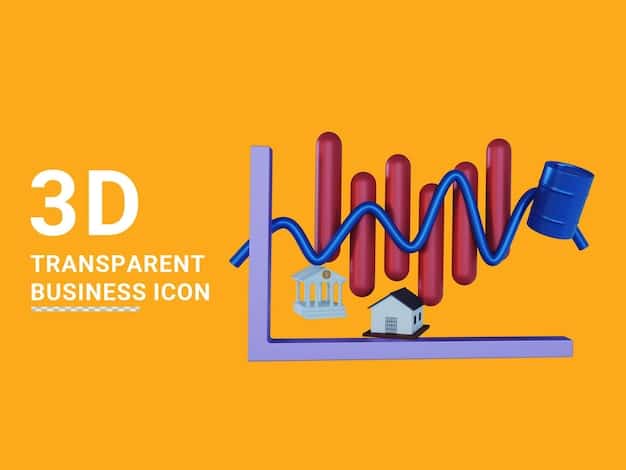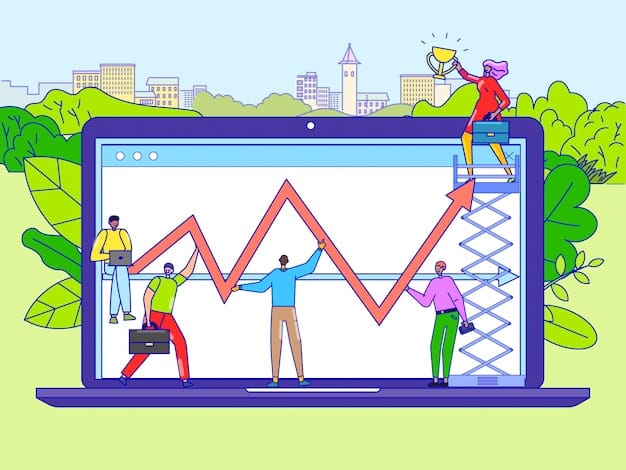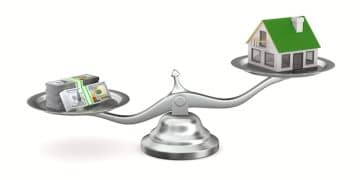Navigating Your Finances: How a 3.2% Inflation Rate in 2025 Affects Your Budget

How Will the Projected 3.2% Inflation Rate in 2025 Impact Your Personal Budget? It affects purchasing power, savings, and investments, requiring proactive adjustments to maintain financial stability through careful budgeting, strategic spending, and diversified investment strategies.
Planning for the future requires understanding economic forecasts, and one significant factor is the projected inflation rate. So, **How Will the Projected 3.2% Inflation Rate in 2025 Impact Your Personal Budget?** It’s important to consider how this economic shift might affect your personal finances. Let’s explore how you can prepare and adjust your budget to navigate these changes effectively.
What is Inflation and Why Does it Matter?
Inflation is the rate at which the general level of prices for goods and services is rising, and subsequently, purchasing power is falling. Understanding inflation is crucial because it directly affects how much you can buy with your money. When inflation rises, each dollar you have buys less, which means you need more money to maintain the same standard of living.
Understanding the Basics of Inflation
Inflation erodes the value of money over time. A 3.2% inflation rate means that, on average, prices are expected to increase by 3.2% in 2025 compared to the previous year. While 3.2% might seem small, its cumulative effect can significantly impact your budget and financial planning.
How Inflation Affects Different Areas of Your Life
From everyday expenses to long-term investments, inflation touches almost every aspect of your finances. It influences the cost of groceries, gas, housing, and healthcare, as well as the returns on your savings and investments. Being aware of these effects allows you to make informed decisions and protect your financial well-being.
- Daily Expenses: Expect to pay more for groceries, transportation, and utilities.
- Savings: The real value of your savings can decrease if interest rates don’t keep pace with inflation.
- Investments: Some investments can outpace inflation, but others might not perform as well.
In conclusion, understanding what inflation is and how it affects your life is the first step to preparing your personal budget for the challenges it poses. By grasping these fundamentals, you can better plan for your financial future and minimize the negative impacts of rising prices.
Projected 3.2% Inflation Rate in 2025: A Closer Look
The projected 3.2% inflation rate for 2025 is a forecast, and like all forecasts, it comes with a degree of uncertainty. However, it provides a valuable benchmark for planning your finances. Understanding the factors that contribute to this projection can help you make more informed decisions.

Factors Contributing to the Projected Inflation Rate
Several factors play a role in determining the inflation rate, including government policies, supply chain dynamics, and global economic conditions. Changes in these factors can either accelerate or decelerate inflation.
Historical Inflation Rates and Trends
Looking back at historical inflation rates can provide context and insight into potential future trends. By examining past patterns, you can get a sense of how inflation has behaved in different economic environments and use this information to inform your financial strategies.
To contextualize, consider historical moments of low, normal, and high inflation in the US: moments when inflation fell below between 1-3%; moments when it was considered normal – around 4-6%, and peak moments during economic crisis or global conflict when inflation reached alarming levels, such as the double-digit crises of the 1970s.
- Government Policies: Fiscal and monetary policies can significantly influence inflation.
- Supply Chain: Disruptions can lead to higher prices due to scarcity.
- Global Economy: International trade and economic conditions affect domestic prices.
In summary, understanding the projected 3.2% inflation rate for 2025 involves considering the various factors contributing to it and examining historical trends. This knowledge can help you better anticipate and prepare for the potential impacts on your personal budget.
How Inflation Impacts Your Spending Habits
Inflation directly affects your spending habits by reducing your purchasing power. When prices rise, you have to make tough decisions about what to prioritize and how to cut back. This section explores how inflation influences different areas of your spending and offers strategies for managing these changes.
Changes in the Cost of Essential Goods and Services
Essential goods and services, such as food, energy, and healthcare, are often the most noticeable when inflation rises. These items are essential for daily life, so increases in their prices can put a significant strain on your budget. For example, the impact of the 3.2% inflation rate would affect the overall cost of the transportation, groceries, housing, and utilities.
Strategies for Reducing Spending During Inflation
To mitigate the impact of inflation on your spending, consider implementing strategies to reduce your expenses. This might involve finding cheaper alternatives, cutting back on non-essential purchases, or negotiating better deals on services.
To start reducing spending during times of inflation, make a list of all your expenses (even the smallest ones). Divide them into needs and wants. Analyze how much you are allocating for wants and consider reducing or eliminating those expenses. Here are some examples:
- Budgeting: Create a detailed budget to track your income and expenses.
- Comparison Shopping: Look for the best deals on essential items.
- Reduce Non-Essentials: Cut back on discretionary spending like dining out and entertainment.
In conclusion, inflation significantly impacts your spending habits by increasing the cost of essential goods and services. However, by implementing effective spending reduction strategies, you can manage these changes and protect your financial stability.
Adjusting Your Savings and Investment Strategies
Inflation not only affects your spending but also your savings and investments. To protect your wealth from the eroding effects of inflation, it’s essential to adjust your savings and investment strategies. This section explores how inflation impacts your long-term financial goals and offers strategies for adapting your approach.
Protecting Your Savings from Inflation
The real value of your savings can decrease if the interest rates you earn don’t keep pace with inflation. Consider options that offer higher yields, such as high-yield savings accounts or certificates of deposit (CDs), to help your savings grow faster than the inflation rate.
Investment Options That Outpace Inflation
Certain investment options have the potential to outpace inflation and provide real returns. These might include stocks, real estate, and commodities. Diversifying your investment portfolio can help you manage risk and increase your chances of achieving your financial goals.
Consider that the most important aspect while investing in any of those options is setting how much risk is acceptable to the investor. For example, stocks are typically more volatile than government bonds, but historically, stocks have provided higher returns over the long term. Real estate also tends to increase in value during times of inflation, but it may also require significant upfront investment and maintenance costs. Commodities, such as gold and silver, are often seen as a hedge against inflation, although their prices can still be unpredictable.
- High-Yield Accounts: Seek savings accounts with competitive interest rates.
- Diversified Portfolio: Invest in a mix of stocks, bonds, and real estate.
- Inflation-Indexed Securities: Consider Treasury Inflation-Protected Securities (TIPS).
In summary, adjusting your savings and investment strategies is crucial for protecting your wealth from inflation. By exploring higher-yield savings options and diversifying your investment portfolio, you can increase your chances of outpacing inflation and achieving your long-term financial goals.
Strategies for Increasing Your Income
In addition to reducing spending and adjusting your savings, increasing your income can help you better cope with inflation. This section explores various strategies for boosting your income and provides practical tips for implementing them.

Negotiating a Raise at Your Current Job
One of the most direct ways to increase your income is to negotiate a raise at your current job. To prepare for this conversation, research industry standards for your position and highlight your accomplishments and contributions to the company. Be confident and present a clear case for why you deserve a raise.
Exploring Additional Income Streams
Consider exploring additional income streams, such as freelancing, part-time work, or starting a side business. These additional sources of income can provide a financial cushion to help you manage rising prices.
Nowadays, there are many resources for exploring additional streams of income, from using platforms like Upwork or Freelancer, to deliver services online, to finding local opportunities for becoming a driver for rideshare apps like Uber or Lyft.
- Negotiate Salary: Research industry standards and present your value to your employer.
- Freelancing: Offer your skills on platforms like Upwork or Fiverr.
- Part-Time Work: Consider a second job to supplement your income.
In conclusion, increasing your income can provide significant relief from the pressures of inflation. By negotiating a raise and exploring additional income streams, you can enhance your financial stability and better manage rising prices.
Long-Term Financial Planning in an Inflationary Environment
Long-term financial planning becomes even more critical in an inflationary environment. This section explores how inflation can impact your long-term financial goals, such as retirement and homeownership, and offers strategies for adapting your plans.
Adjusting Retirement Plans for Inflation
Inflation can significantly impact your retirement savings, as the purchasing power of your savings may decrease over time. To address this, consider increasing your retirement contributions and adjusting your investment strategy to include assets that can outpace inflation.
Planning for Major Purchases Like a Home
Major purchases like a home can also be affected by inflation. Rising prices can make it more difficult to save for a down payment and afford mortgage payments. Consider strategies such as saving aggressively, exploring different mortgage options, and being flexible with your timeline.
To better prepare a long-term financial plan, it’s important to forecast the savings as accurately as possible. Use online calculators and financial advisor services to simulate potential scenarios and build strategies to deal with them ahead of time.
- Increase Contributions: Save more for retirement to offset inflation’s impact.
- Mortgage Options: Explore fixed-rate mortgages to lock in predictable payments.
- Financial Advisor: Seek professional advice for personalized planning.
In summary, long-term financial planning is crucial in an inflationary environment. By adjusting your retirement plans and preparing for major purchases, you can mitigate the impact of inflation and achieve your long-term financial goals.
| Key Point | Brief Description |
|---|---|
| 💸 Budgeting | Track income and expenses to identify areas for savings. |
| 💰 Savings | Explore high-yield accounts and inflation-indexed securities. |
| 💼 Income | Negotiate salary increases and explore additional income streams. |
| 📈 Investing | Diversify your portfolio with inflation-beating asset classes. |
Frequently Asked Questions (FAQ)
▼
Inflation is the rate at which the general level of prices for goods and services is rising, and subsequently, purchasing power is falling. It’s usually expressed as a percentage, indicating the annual increase in prices.
▼
Inflation increases the cost of everyday goods and services like groceries, gas, and utilities. This means you need more money to buy the same items, reducing your overall purchasing power.
▼
Consider high-yield savings accounts, certificates of deposit (CDs), or Treasury Inflation-Protected Securities (TIPS). These options offer interest rates that can help your savings keep pace with inflation.
▼
Yes, certain investments like stocks, real estate, and commodities have the potential to outpace inflation. Diversifying your portfolio with these assets can help manage risk and provide better returns.
▼
Negotiate a raise at your current job, explore freelancing or part-time work, or consider starting a side business. These strategies can provide additional income streams to help you manage rising prices.
Conclusion
Understanding the impact of a projected 3.2% inflation rate in 2025 on your personal budget is crucial for maintaining financial stability. By adjusting your spending habits, savings, and investment strategies, as well as exploring ways to increase your income, you can effectively navigate the challenges posed by inflation and secure your financial future.





